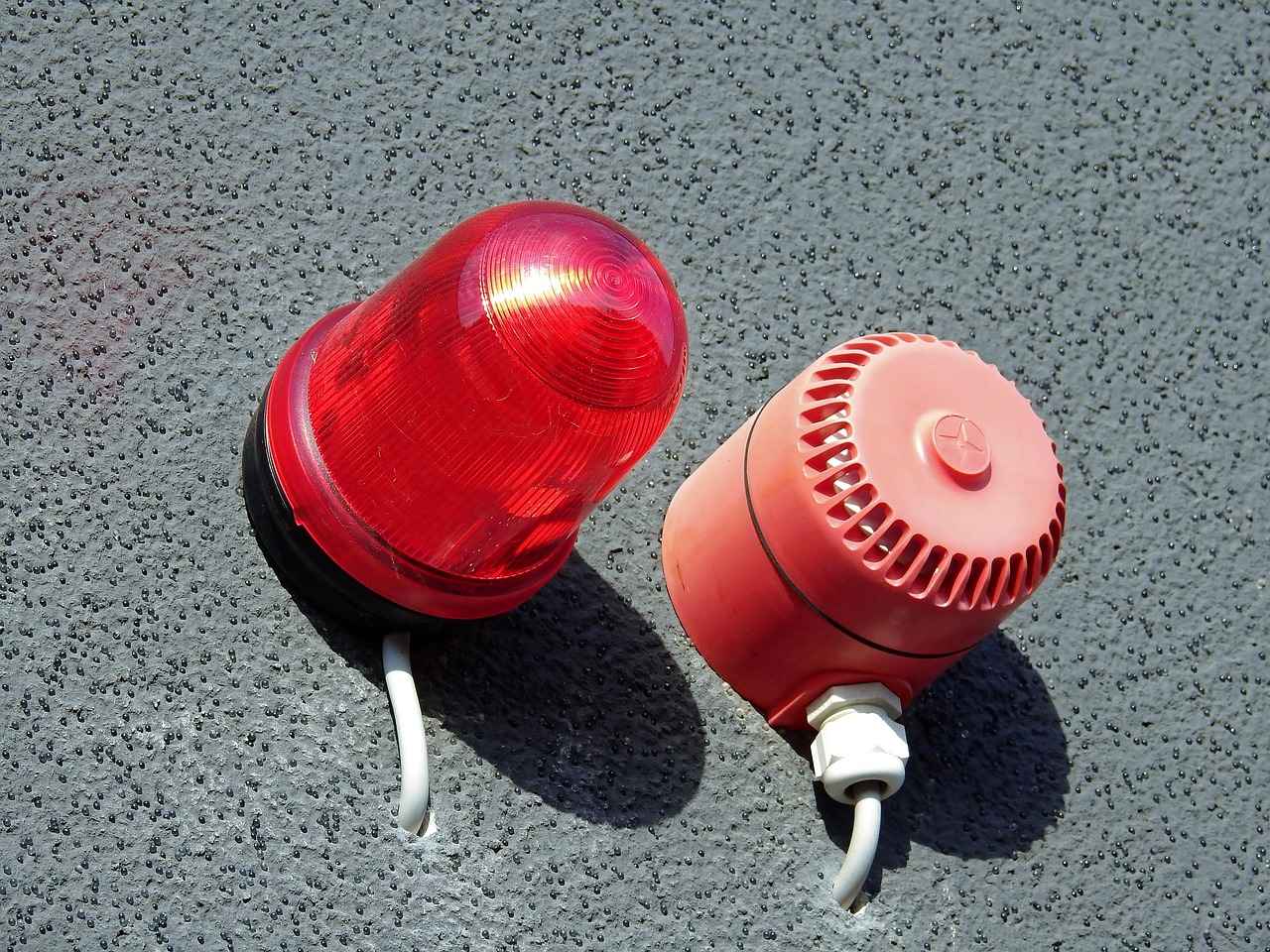This article serves as a comprehensive guide on disabling the alarm system of a Honda Accord without using the key, ensuring a hassle-free experience for vehicle owners. Understanding how to manage your vehicle’s alarm system can save you time and prevent unnecessary frustration.
Understanding the common reasons behind alarm activation is crucial. Some typical triggers include:
- Door Sensors: If a door is not closed properly, the alarm may activate.
- Motion Detection: Sudden movements near the vehicle can set off the alarm.
- Battery Issues: A weak or failing battery can lead to false alarms.
Different Honda Accord models may have varying alarm systems. Identifying your specific system is essential for effective troubleshooting. Look for:
- Owner’s Manual: This document typically outlines the alarm features.
- Alarm Indicator Light: A blinking light on the dashboard indicates an active alarm system.
Distinguishing between factory-installed and aftermarket alarm systems can help you determine the appropriate method for disabling the alarm without a key. Factory systems are generally easier to manage.
Familiarizing yourself with the features of your Honda Accord’s alarm system can aid in understanding how to effectively disable it without a key. Common features include:
- Remote Locking: Allows you to lock/unlock doors remotely.
- Shock Sensors: Detect impacts and trigger the alarm.
Follow these practical steps to turn off your Honda Accord’s alarm system without needing the key:
If you have access to a key fob, it may provide a simple method to disable the alarm. Pressing the unlock button typically resets the alarm.
In the absence of a key fob, manual override methods can be employed. Try the following:
- Lock and Unlock: Use the physical key to lock and then unlock the driver’s door.
- Insert Key in Ignition: Turn the ignition on and off several times, which may reset the alarm.
Resetting the alarm system can be an effective way to clear any malfunctions:
Disconnecting the vehicle’s battery can reset the alarm system. This method is often effective but requires caution to avoid electrical issues. Always disconnect the negative terminal first.
After a brief disconnection period, reconnecting the battery can restore the vehicle’s electrical systems, including the alarm, potentially resolving any alarm-related issues.
If the alarm system remains unresponsive despite your efforts, it may be time to consult a professional. Signs you may need assistance include:
- Persistent Alarm: If the alarm continues to go off without reason.
- Electrical Issues: If other electrical systems in the car are malfunctioning.
Implementing preventive measures can help minimize the risk of alarm system malfunctions in the future:
Conducting regular maintenance checks on your vehicle’s alarm system can help identify potential issues before they become problems. This may include checking sensors and battery health.
Familiarizing yourself with the security features of your Honda Accord can empower you to manage and troubleshoot alarm issues more effectively. Knowledge is key to avoiding future complications.

What Causes the Honda Accord Alarm to Trigger?
Understanding the common reasons behind alarm activation in your Honda Accord is essential for effective vehicle management and security. Alarm systems are designed to protect your vehicle, but they can sometimes be triggered unintentionally. By learning the typical causes of alarm activation, you can take proactive measures to prevent future occurrences and manage your vehicle’s security system more effectively.
There are several factors that can lead to the alarm system in your Honda Accord being triggered. Here are some of the most common causes:
- Unauthorized Entry: The primary purpose of an alarm system is to deter theft. If someone attempts to break into your vehicle, the alarm will sound. This is a standard security feature designed to protect your belongings.
- Faulty Sensors: Over time, the alarm sensors may become faulty or misaligned. This can lead to false alarms, causing the system to activate without any real threat. Regular maintenance can help identify and rectify these issues.
- Low Battery Voltage: A weak or low battery can cause the alarm system to malfunction. If the battery voltage drops significantly, it may trigger the alarm unexpectedly. Keeping your vehicle’s battery in good condition is crucial for the alarm’s functionality.
- Environmental Factors: Sudden changes in temperature, strong winds, or even passing vehicles can sometimes trigger the alarm. This is particularly common in models with sensitive motion detectors.
- Aftermarket Modifications: If you have installed aftermarket alarm systems or other electronic devices, they may interfere with the factory-installed alarm system. This can lead to unexpected activations and complicated troubleshooting.
- Key Fob Malfunction: A malfunctioning key fob can also lead to alarm issues. If the fob sends incorrect signals or is damaged, it may unintentionally trigger the alarm.
By understanding these common triggers, you can take steps to minimize the chances of false alarms and ensure that your vehicle remains secure. Regularly checking the condition of your alarm system, including its sensors and battery, can help you maintain its effectiveness.
To avoid the frustration of frequent alarm activations, consider implementing the following preventive measures:
- Regular Maintenance: Schedule routine checks for your vehicle’s alarm system to ensure all components are functioning correctly. This can help detect any issues before they escalate.
- Educate Yourself: Familiarize yourself with your Honda Accord’s alarm features and settings. Understanding how your system works can empower you to troubleshoot minor issues independently.
- Secure Your Vehicle: Always ensure your vehicle is locked properly. Sometimes, alarms may trigger due to doors not being fully closed or locked.
- Consider Upgrades: If your alarm system is outdated or frequently malfunctions, consider upgrading to a more reliable system that fits your security needs.
By taking these proactive steps, you can enhance your vehicle’s security and reduce the likelihood of alarm issues, ensuring a smoother driving experience.

How to Identify Your Honda Accord Alarm System
Identifying the specific alarm system in your Honda Accord is essential for effective troubleshooting and resolution of alarm issues. With various models and years, Honda has implemented different alarm systems, each with unique features and functionalities. Understanding these differences can save time and enhance your vehicle’s security management.
Recognizing your Honda Accord’s alarm system is crucial for several reasons:
- Effective Troubleshooting: Knowing the specific system allows you to follow the correct procedures for disabling or resetting the alarm.
- Preventing False Alarms: Understanding your alarm’s features can help you avoid unnecessary disturbances caused by false triggers.
- Enhanced Security: A well-understood system can be better managed, ensuring your vehicle remains secure.
To identify which alarm system your Honda Accord is equipped with, follow these steps:
- Check the Owner’s Manual: Your vehicle’s manual typically contains detailed information about the alarm system, including its features and functionalities.
- Inspect the Key Fob: The key fob may have specific buttons or features that indicate the type of alarm system installed. Look for symbols or additional buttons that may control the alarm.
- Look for Indicator Lights: Many Honda Accords have dashboard indicators that light up when the alarm is armed or triggered. Familiarizing yourself with these lights can provide clues about your system.
- Consult Online Resources: Websites and forums dedicated to Honda vehicles can provide valuable insights from other owners and experts about different alarm systems.
It’s essential to distinguish between factory-installed and aftermarket alarm systems:
- Factory Alarms: These systems are integrated into the vehicle’s wiring and are designed for seamless operation. They often come with standard features that are easy to manage.
- Aftermarket Alarms: Installed post-purchase, these systems can vary widely in complexity and functionality. They may offer advanced features but can also pose challenges during troubleshooting.
Familiarizing yourself with the common features of Honda Accord alarm systems can aid in identifying your specific system:
- Shock Sensors: Detects impacts to the vehicle, triggering the alarm.
- Door Sensors: Monitors door integrity and alerts if a door is opened without the key.
- Panic Mode: Activates the alarm and lights when the panic button is pressed on the key fob.
Understanding your Honda Accord’s alarm system is vital for effective management and troubleshooting. By following the steps outlined above, you can easily identify your system, whether it’s a factory-installed model or an aftermarket version. This knowledge not only helps in resolving alarm issues but also enhances the overall security of your vehicle.
Understanding Factory vs. Aftermarket Alarms
When it comes to vehicle security, understanding the differences between factory-installed and aftermarket alarm systems is crucial for any Honda Accord owner. These distinctions can significantly influence how you manage and disable your car’s alarm system without a key.
Factory-installed alarm systems are designed and integrated directly by the manufacturer. They are typically tailored to the vehicle’s specific electrical architecture, ensuring seamless operation. These systems often include features such as:
- Integrated Remote Keyless Entry: Allows for easy locking and unlocking.
- Vehicle Tracking: Some models offer GPS tracking for added security.
- Simple Troubleshooting: Since they are designed for the specific model, diagnosing issues is often straightforward.
Aftermarket alarm systems, on the other hand, are installed post-purchase and can vary widely in terms of features and complexity. These systems may offer advanced functionalities but come with their own set of challenges:
- Complex Wiring: Installation may involve intricate wiring that complicates troubleshooting.
- Compatibility Issues: Not all aftermarket systems work seamlessly with factory electronics.
- Varied Quality: The effectiveness of these systems can vary based on the manufacturer.
Determining whether your Honda Accord has a factory-installed or aftermarket alarm system is essential for effective management. Look for signs such as:
- Original documentation or manuals that specify the alarm type.
- Presence of additional remote fobs or keypads that may indicate an aftermarket installation.
- Visual inspection of wiring under the dashboard for signs of aftermarket modifications.
Understanding whether your alarm system is factory-installed or aftermarket can help you choose the right method for disabling the alarm without a key. For example:
- Factory Systems: Often can be reset using the vehicle’s ignition or remote key fob.
- Aftermarket Systems: May require more complex procedures, such as accessing the alarm’s main unit directly.
In summary, knowing the type of alarm system in your Honda Accord is vital for effective troubleshooting and management. By distinguishing between factory-installed and aftermarket systems, you can navigate the process of disabling the alarm more efficiently, ensuring a smoother experience when your key is unavailable.
Benefits of Factory Alarm Systems
When it comes to vehicle security, understanding the is crucial for any car owner. Factory alarm systems are designed specifically for the vehicle they are installed in, offering a range of advantages over aftermarket options. This article will delve into these benefits, ensuring you have a comprehensive understanding of why factory systems are often the preferred choice.
One of the most significant advantages of factory alarm systems is their seamless integration with the vehicle’s electrical system. Unlike aftermarket systems, which may require complex wiring and adjustments, factory alarms are designed to work harmoniously with the vehicle’s existing components. This integration allows for more reliable performance and reduces the risk of electrical issues that can arise from improper installation.
Factory alarm systems typically offer a range of features that enhance vehicle security. For instance, many factory systems come equipped with features such as motion sensors, glass break sensors, and panic buttons. These features provide comprehensive protection against theft and vandalism, ensuring that your vehicle remains secure in various situations.
Another advantage of factory alarm systems is the ease of troubleshooting. Since these systems are specifically designed for the vehicle, mechanics and technicians are often more familiar with their operation. This familiarity can lead to quicker diagnostics and repairs, saving time and money for vehicle owners. In contrast, aftermarket systems may require specialized knowledge, making troubleshooting more challenging.
Choosing a factory-installed alarm system often means that you benefit from the manufacturer’s warranty. This warranty can provide peace of mind, knowing that any issues that arise will be covered by the manufacturer. Additionally, factory systems typically come with customer support from the manufacturer, making it easier to resolve any concerns or questions you may have about the alarm system.
Vehicles equipped with factory alarm systems often have a higher resale value compared to those with aftermarket systems. Buyers tend to prefer vehicles that come with original equipment, as they are viewed as more reliable and trustworthy. This preference can translate into better offers when it comes time to sell or trade in your vehicle.
Factory alarm systems are typically designed to minimize the occurrence of false alarms. This is crucial for maintaining the integrity of the alarm system and ensuring that it functions as intended. Aftermarket systems, on the other hand, may be more prone to false triggers due to improper installation or incompatible components, leading to frustration for vehicle owners.
In summary, factory alarm systems provide numerous benefits that enhance vehicle security and owner convenience. From seamless integration with the vehicle’s electrical system to easier troubleshooting and maintenance, these systems are designed with the vehicle in mind. By choosing a factory-installed alarm, vehicle owners can enjoy peace of mind, knowing their investment is well protected.
Challenges of Aftermarket Alarm Systems
When it comes to vehicle security, aftermarket alarm systems are often chosen for their advanced features and customization options. However, they come with their own set of challenges that can complicate the overall user experience. Understanding these challenges is essential for Honda Accord owners who may be considering or currently using an aftermarket alarm system.
Aftermarket alarm systems can often present unique challenges that differ significantly from factory-installed systems. Here are some of the most prevalent issues:
- Complex Wiring: One of the primary challenges with aftermarket alarms is the intricate wiring involved in their installation. Unlike factory systems that are designed to integrate seamlessly with the vehicle’s electrical architecture, aftermarket systems may require additional modifications. This complexity can lead to confusion during installation and troubleshooting.
- Installation Errors: Improper installation can result in frequent false alarms or failure to trigger when needed. Many vehicle owners may not have the technical expertise required to install these systems correctly, leading to potential security vulnerabilities.
- Compatibility Issues: Not all aftermarket alarms are compatible with every vehicle model. Owners of Honda Accords may find that certain systems do not function as intended due to compatibility issues, which can complicate the disabling of the alarm without a key.
- Limited Support: Unlike factory systems that come with manufacturer support, aftermarket alarms often rely on third-party vendors for assistance. This lack of direct support can make troubleshooting more difficult.
- Difficulty in Disabling: Disabling an aftermarket alarm without a key can be particularly challenging due to the complex wiring and programming involved. This can lead to frustration for owners who may find themselves locked out of their vehicles.
Many aftermarket alarm systems come equipped with advanced features such as remote start, GPS tracking, and smartphone integration. While these features enhance security and convenience, they also add layers of complexity to the system. Understanding how these features work can help owners manage their alarms more effectively.
When selecting an aftermarket alarm system for your Honda Accord, consider the following:
- Professional Installation: Hiring a professional installer can mitigate many of the challenges associated with complex wiring and ensure that the system is set up correctly.
- Brand Reputation: Researching reputable brands known for quality and reliability can help avoid compatibility issues and ensure better support.
- Feature Set: Evaluate the features that are most important to you. While advanced features can be appealing, they may also complicate the system.
For owners experiencing issues with their aftermarket alarm systems, troubleshooting is key. Here are some practical steps:
- Check Wiring Connections: Ensure all wiring connections are secure and free from damage.
- Consult the Manual: Refer to the user manual for specific troubleshooting steps related to your alarm model.
- Seek Professional Help: If issues persist, consulting a professional can save time and prevent further complications.
In summary, while aftermarket alarm systems offer enhanced security features, they present unique challenges that require careful consideration and management. By understanding these challenges and taking proactive steps, Honda Accord owners can effectively navigate the complexities of aftermarket alarms.
Common Features of Honda Accord Alarm Systems
Familiarizing yourself with the features of your Honda Accord’s alarm system is essential for understanding how to effectively disable it without a key. Alarm systems are designed to protect your vehicle from theft and unauthorized access, but they can sometimes become a source of frustration for owners. In this section, we will explore the common features of Honda Accord alarm systems and how they function.
- Shock Sensors: These sensors detect vibrations or impacts, triggering the alarm if someone attempts to break into the vehicle.
- Door Sensors: These sensors monitor the status of the doors. If a door is opened without the key fob or remote, the alarm will sound.
- Ignition Kill Switch: This feature prevents the engine from starting if the alarm is activated, making it difficult for thieves to steal the car.
- LED Indicator: A blinking LED light on the dashboard serves as a visual deterrent, indicating that the vehicle is secured.
- Remote Key Fob: The key fob allows you to lock and unlock the vehicle as well as arm or disarm the alarm system from a distance.
The Honda Accord alarm system operates through a network of sensors and the vehicle’s onboard computer. When the alarm is armed, the sensors continuously monitor for unauthorized access. If a breach is detected, the system activates the siren and flashes the headlights, drawing attention to the vehicle.
Additionally, the alarm system may include features such as:
- Silent Mode: This mode allows the alarm to trigger without sounding the siren, which can be useful in certain situations.
- Panic Button: The key fob typically includes a panic button that activates the alarm and lights, helping to alert others in case of an emergency.
Understanding the features of your Honda Accord alarm system is crucial for several reasons:
- Effective Troubleshooting: Knowing how the system works can help you identify and resolve issues more efficiently.
- Preventing False Alarms: Familiarity with the system can aid in preventing unnecessary alarm activations, which can be both annoying and disruptive.
- Security Awareness: Being aware of the alarm features enhances your overall vehicle security, allowing you to take proactive measures against theft.
In situations where you find yourself needing to disable the alarm without a key, understanding the system’s features can be invaluable. For instance, using the manual override methods or the key fob can effectively deactivate the alarm. If these options are unavailable, disconnecting the battery may serve as a last resort to reset the system.
In conclusion, familiarizing yourself with the common features of your Honda Accord alarm system not only empowers you to manage and troubleshoot alarm issues effectively but also enhances your vehicle’s security. By understanding how these systems operate, you can ensure a hassle-free experience and maintain peace of mind regarding your vehicle’s safety.

Steps to Disable the Alarm Without a Key
When faced with the challenge of disabling your Honda Accord’s alarm system without the key, it’s essential to approach the situation calmly and methodically. Many vehicle owners experience alarm malfunctions or accidental triggers, which can be frustrating. This guide will provide you with practical steps to disable the alarm system efficiently, ensuring you regain access to your vehicle without the need for a key.
Follow these practical steps to turn off the alarm system of your Honda Accord without needing the key, ensuring a straightforward approach for vehicle owners:
- Check the Key Fob: If you have access to your key fob, press the unlock button. This is often the simplest method to disable the alarm. Ensure the fob is functioning properly and has a working battery.
- Use the Door Lock: Manually insert your key into the driver’s side door lock. Turn the key to the unlock position. This action may reset the alarm system.
- Disconnect the Battery: If the alarm persists, you may need to disconnect the vehicle’s battery. Locate the battery under the hood, use a wrench to loosen the negative terminal, and remove it for about 10 minutes. This will reset the alarm system.
- Reconnect the Battery: After waiting, reconnect the negative terminal. Ensure it’s securely fastened. Start your vehicle to check if the alarm has been disabled.
- Locate the Alarm Module: If the alarm remains active, locate the alarm module, usually found under the dashboard or near the fuse box. Disconnecting the module can disable the alarm, but this step may require some technical knowledge.
It’s crucial to understand that different Honda Accord models may have unique alarm systems. Familiarizing yourself with your specific model can make troubleshooting easier. If you find yourself in a situation where the alarm continues to sound, consider the following:
- Consult the Owner’s Manual: Your vehicle’s owner manual can provide specific instructions tailored to your model.
- Seek Professional Help: If you are unable to disable the alarm, it may be wise to consult a professional automotive locksmith or a Honda dealership. They can provide expert assistance and ensure your vehicle’s alarm system is functioning correctly.
By following these steps, you can effectively manage your Honda Accord’s alarm system without the key. Understanding your vehicle’s specific alarm features and functions will empower you to handle similar situations in the future. Always remember to prioritize safety and seek professional help when necessary.
Using the Key Fob
When it comes to managing the security features of your Honda Accord, understanding how to use your key fob effectively can make a significant difference. This small device is not just a convenience; it can also serve as a straightforward method to disable the alarm system, providing a quick solution when you’re in a pinch.
The key fob operates using radio frequency technology. When you press a button on the fob, it sends a signal to your vehicle’s alarm system. This signal can either activate or deactivate the alarm, depending on the button pressed. It’s essential to understand the functions of the buttons on your key fob for effective usage.
- Approach Your Vehicle: Ensure you are within a reasonable distance from your Honda Accord, as the key fob has a limited range.
- Press the Unlock Button: This is often the simplest method. Press the unlock button on your key fob to disable the alarm. You should hear a confirmation sound indicating the alarm is off.
- Use the Panic Button: In some cases, pressing the panic button can also reset the alarm system. This button typically triggers the horn and lights, serving as a dual function.
While using your key fob is usually straightforward, there can be occasional issues that may prevent it from functioning correctly:
- Dead Battery: A common issue is a dead battery in the key fob. If the fob does not respond, consider replacing the battery.
- Signal Interference: Other electronic devices or physical barriers can interfere with the signal from the key fob. Ensure there are no obstructions when attempting to disable the alarm.
- Programming Issues: Sometimes, the key fob may need reprogramming, especially if it has been recently replaced or if the vehicle’s system has been reset.
If your key fob fails to disable the alarm, you may need to resort to alternative methods:
- Manual Override: Some Honda Accord models have a manual override option that allows you to disable the alarm without the fob. Refer to your owner’s manual for specific instructions.
- Disconnecting the Battery: As a last resort, disconnecting the battery can reset the alarm system. However, this should be done with caution to avoid damaging the vehicle’s electrical systems.
To ensure your key fob remains functional, consider the following maintenance tips:
- Replace the Battery Regularly: Keep an eye on the battery life of your key fob and replace it as needed.
- Keep it Clean: Dirt and grime can accumulate on the buttons, which may hinder functionality. Clean your key fob regularly.
- Store It Safely: Avoid dropping or exposing the key fob to extreme temperatures, which can damage its internal components.
By understanding how to use your key fob effectively, you can ensure a smoother experience when managing your Honda Accord’s alarm system. Always remember to maintain your key fob and be aware of potential issues that may arise.
Manual Override Methods
When faced with a situation where your Honda Accord alarm is triggered and you lack access to the key fob, there are several you can utilize. These techniques are essential for regaining control over your vehicle’s alarm system, ensuring you can access your car without hassle.
Understanding the importance of manual override methods is crucial. They allow you to disable the alarm system without the key, which can be particularly useful in emergencies or when the key fob is lost. Additionally, these methods can help you avoid costly service fees associated with locksmiths or dealerships.
- Using the Ignition Key: In many cases, inserting the ignition key into the door lock and turning it may deactivate the alarm. This method is straightforward and often the first step to take.
- Door Lock Method: Locking and unlocking the driver’s side door with the key can sometimes reset the alarm system. This method is worth trying if the alarm continues to sound.
- Using the Trunk Release: If your Honda Accord has a trunk release button, using it may help reset the alarm. This can be an effective method, especially if the alarm is triggered while the trunk is open.
1. Approach your Honda Accord calmly to avoid triggering the alarm further.2. Insert the ignition key into the driver’s side door lock.3. Turn the key to the unlock position and hold it for a few seconds.4. If the alarm does not deactivate, try locking and unlocking the door again.5. If unsuccessful, try using the trunk release method.
In addition to the methods mentioned, here are some extra tips that may assist you:
- Check the Owner’s Manual: Your Honda Accord’s owner manual may contain specific instructions for your model regarding alarm deactivation.
- Battery Disconnection: If all else fails, disconnecting the battery for a few minutes can reset the entire electrical system, including the alarm.
- Seek Professional Help: If you find yourself unable to disable the alarm, consider consulting a professional locksmith or Honda dealer to avoid potential damage to your vehicle.
Familiarizing yourself with your Honda Accord’s alarm system can enhance your ability to manage it effectively. Knowing whether you have a factory-installed or aftermarket alarm can dictate the methods available for manual override. Aftermarket systems may have different procedures, so it’s essential to identify your specific setup.
To minimize the chances of alarm activation without reason, consider the following preventive measures:
- Regular Maintenance: Schedule regular checks of your vehicle’s alarm system to ensure it functions correctly.
- Familiarize Yourself with Features: Understanding how your alarm system works can help you troubleshoot issues more efficiently.
- Keep Spare Keys Handy: Always have a spare key fob or physical key accessible to prevent lockouts.
By employing these manual override methods and understanding your vehicle’s alarm system, you can effectively manage any alarm-related issues that may arise.

How to Reset the Alarm System
Resetting the alarm system of your Honda Accord can be a crucial step in ensuring the vehicle operates smoothly. Over time, alarm systems can develop malfunctions due to various reasons, including battery issues, faulty sensors, or even software glitches. Understanding how to reset your alarm system can help you clear these malfunctions and restore normal functionality.
Resetting your alarm system is vital for several reasons:
- Clears Malfunctions: A reset can eliminate temporary glitches that cause the alarm to trigger unnecessarily.
- Restores Functionality: It reestablishes the normal operation of the alarm system, ensuring it works as intended.
- Enhances Security: A properly functioning alarm system is essential for the security of your vehicle.
Follow these steps to reset your alarm system:
One of the most effective methods to reset the alarm system is by disconnecting the vehicle’s battery. Here’s how to do it:
1. Open the hood of your Honda Accord.2. Locate the battery and identify the negative (-) terminal.3. Using a wrench, carefully loosen the nut on the negative terminal and disconnect it.4. Wait for at least 10 minutes to ensure a complete reset.5. Reconnect the negative terminal and tighten the nut securely.6. Close the hood and check if the alarm system is functioning properly.
After disconnecting the battery, reconnecting it is equally important:
1. Ensure all connections are clean and free of corrosion.2. Reattach the negative terminal first, followed by the positive (+) terminal if applicable.3. Start your vehicle and observe if the alarm system has reset.
If disconnecting the battery does not resolve the issue, consider these additional methods:
If you have access to your key fob, it can be a simple way to reset the alarm:
1. Press the unlock button on your key fob twice.2. This action can sometimes reset the alarm system and allow you to regain control.
In cases where the key fob is unavailable, you can utilize manual override techniques:
1. Insert the key into the ignition and turn it to the 'On' position without starting the engine.2. Wait for 10 seconds and then turn it back to the 'Off' position.3. Repeat this process a few times to reset the alarm system.
If your alarm system remains unresponsive after attempting these resets, it may be time to consult a professional. Signs that professional assistance is needed include:
- Persistent alarm triggers without cause.
- Inability to disable the alarm using standard methods.
- Visible signs of damage to the alarm system or wiring.
To minimize the risk of alarm malfunctions in the future, consider these preventive measures:
- Regular Maintenance: Schedule routine checks of your vehicle’s electrical systems.
- Understanding Security Features: Familiarize yourself with your Honda Accord’s alarm features to manage potential issues proactively.
Disconnecting the Battery
Disconnecting the vehicle battery is a common method used to reset the alarm system in many vehicles, including the Honda Accord. This technique can be particularly useful when the alarm becomes unresponsive or triggers unexpectedly. However, it is important to approach this method with caution to prevent any potential electrical issues.
The alarm system in your Honda Accord is integrated with the vehicle’s electrical system. By disconnecting the battery, you effectively cut off power to the alarm, allowing it to reset. This can clear any glitches or malfunctions that may have caused the alarm to activate without reason. However, it’s crucial to follow the correct procedure to avoid damaging any electrical components.
- Gather Necessary Tools: You will need a wrench or a socket set to remove the battery terminals.
- Turn Off the Ignition: Ensure that the vehicle is completely off before proceeding.
- Locate the Battery: Open the hood and find the battery, typically located on one side of the engine compartment.
- Disconnect the Negative Terminal: Using your wrench, carefully loosen the nut on the negative terminal (usually marked with a minus sign). Remove the cable and secure it away from the battery.
- Wait for a Few Minutes: Allow the battery to remain disconnected for at least 10 minutes. This waiting period helps ensure that the alarm system resets completely.
- Reconnect the Negative Terminal: After the waiting period, reattach the negative terminal, tightening the nut securely.
While disconnecting the battery can effectively reset the alarm system, there are some precautions you should consider:
- Check for Electrical Issues: Before proceeding, inspect your vehicle for any visible signs of electrical problems, such as frayed wires or corrosion on the battery terminals.
- Be Aware of Settings: Disconnecting the battery may reset other electronic systems in your vehicle, including radio presets and clock settings.
- Use Proper Tools: Ensure that you are using the right tools to avoid damaging the battery terminals or connectors.
Once you have reconnected the battery, start your Honda Accord and check if the alarm system is functioning properly. If the alarm remains unresponsive or continues to trigger unexpectedly, it may indicate a deeper issue that requires professional assistance. Regular maintenance checks on your vehicle’s electrical system can also help prevent future alarm problems.
If you’re unable to resolve the alarm issues through battery disconnection, it might be time to consult with a professional mechanic or automotive locksmith. They can diagnose any underlying problems with your vehicle’s alarm system and provide appropriate solutions.
In conclusion, disconnecting the battery is a straightforward method to reset the alarm system of your Honda Accord. By following the steps outlined and taking necessary precautions, you can effectively manage your vehicle’s alarm issues without the need for a key.
Reconnecting the Battery
When dealing with alarm issues in your Honda Accord, one effective method is . This process can restore your vehicle’s electrical systems, including the alarm, and may resolve any related problems. Understanding how to properly execute this task is essential for maintaining your vehicle’s security and functionality.
Disconnecting and then reconnecting the battery can reset your vehicle’s electrical systems. This action clears temporary glitches that may have caused the alarm to malfunction. When the battery is reconnected, the alarm system undergoes a reset, allowing it to function normally again.
- Gather Necessary Tools: Before starting, ensure you have the right tools. A wrench or socket set is typically required to loosen the battery terminals.
- Turn Off the Vehicle: Make sure your Honda Accord is completely turned off to avoid electrical shocks or further complications.
- Locate the Battery: Open the hood and find the battery. It’s usually located near the front of the engine compartment.
- Disconnect the Negative Terminal: Using your wrench, loosen the nut on the negative terminal (usually marked with a minus sign). Carefully lift the cable off the terminal.
- Wait for a Few Minutes: Allow the vehicle to sit without power for about 10-15 minutes. This waiting period helps reset the electrical systems.
- Reconnect the Negative Terminal: Place the negative cable back onto the terminal and tighten the nut securely.
- Start the Vehicle: Turn on your Honda Accord to check if the alarm system has been reset and is functioning correctly.
While reconnecting the battery can often resolve alarm issues, there are some potential complications to be aware of:
- Electrical System Damage: If the battery is reconnected incorrectly, it may damage sensitive electrical components.
- Alarm System Compatibility: Some aftermarket alarm systems may not reset properly with this method.
- Battery Health: Ensure your battery is in good condition, as a weak battery can lead to further electrical issues.
If reconnecting the battery does not resolve the alarm issue, it may be time to consider professional help. Signs that indicate you should consult a technician include:
- Persistent Alarm Issues: If the alarm continues to trigger without reason, there may be a deeper underlying problem.
- Electrical Malfunctions: Any signs of electrical issues, such as flickering lights or malfunctioning dashboard indicators, warrant professional evaluation.
- Complex Alarm Systems: If your vehicle has an aftermarket alarm system, it may require specialized knowledge to diagnose and repair.
In summary, is a straightforward method to reset your Honda Accord’s alarm system. By following the outlined steps and being aware of potential issues, you can effectively troubleshoot alarm-related problems. If challenges persist, seeking professional assistance can ensure your vehicle’s security system is operating optimally.

When to Seek Professional Help
When dealing with alarm systems in your Honda Accord, there may come a time when the alarm remains unresponsive despite your best efforts to disable it. Recognizing when to seek professional help is crucial, as it can save you both time and frustration.
Understanding the signs that point to the need for professional help can help you avoid unnecessary stress. Here are some indicators to consider:
- Continuous Alarm Activation: If your alarm goes off repeatedly without any clear trigger, it may be malfunctioning.
- Inability to Disable the Alarm: If you’ve tried all methods, including using the key fob and manual overrides, and the alarm remains active, it’s time to consult an expert.
- Warning Lights: If dashboard warning lights related to the alarm system are illuminated, this could indicate a deeper issue.
- Unusual Vehicle Behavior: If your vehicle exhibits strange behaviors, such as locking and unlocking on its own, professional evaluation is necessary.
Consulting a professional can provide several benefits:
- Expert Diagnosis: Automotive experts have the training and tools necessary to diagnose alarm issues accurately.
- Time Efficiency: Professionals can often resolve issues more quickly than a DIY approach, saving you valuable time.
- Prevent Further Damage: Attempting to fix complex alarm systems without proper knowledge can lead to additional problems, potentially costing you more in repairs.
When seeking professional assistance, it’s essential to choose the right automotive locksmith. Here are some tips:
- Check Credentials: Ensure the locksmith is certified and has experience with Honda vehicles.
- Read Reviews: Look for customer reviews and testimonials to gauge the locksmith’s reliability and service quality.
- Ask for Estimates: Before proceeding with any work, ask for a detailed estimate to avoid unexpected costs.
When you consult a professional, here’s what you can generally expect:
- Initial Assessment: The technician will conduct a thorough assessment of your alarm system.
- Detailed Explanation: They will explain the issues found and the steps needed to resolve them.
- Repair or Replacement: Depending on the diagnosis, they may either repair the existing system or recommend a replacement if necessary.
In conclusion, while it can be frustrating to deal with an unresponsive alarm system, knowing when to seek professional help is vital. By recognizing the signs, understanding the benefits of expert assistance, and choosing the right professional, you can ensure that your Honda Accord’s alarm system is functioning correctly, providing you peace of mind.
Signs You Need Professional Assistance
When it comes to managing your vehicle’s alarm system, it is crucial to recognize the signs that indicate the need for professional assistance. Ignoring these signs can lead to more significant issues, including potential damage to your vehicle or compromised security. Understanding when to seek help not only saves time but also ensures the safety and functionality of your Honda Accord.
- Frequent False Alarms: If your alarm goes off without any apparent cause, it may indicate a malfunction. This can be frustrating and may lead to neighbors becoming annoyed.
- Inability to Disable the Alarm: If you find it challenging to turn off the alarm using your key fob or manual methods, this could be a sign of a deeper issue that requires professional intervention.
- Unresponsive Key Fob: A key fob that fails to work consistently can signal battery issues or problems with the alarm system itself.
- Alarm Triggered by Minor Movements: If your alarm is overly sensitive and activates with minor disturbances, it may need recalibration or replacement.
- Dashboard Warning Lights: Any warning lights on your dashboard related to the alarm system should not be ignored. These indicators often point to electrical issues that need expert attention.
Engaging a professional for alarm system issues ensures that your vehicle is handled by someone with the right expertise. Professionals can accurately diagnose complex problems that may not be evident to the average vehicle owner. They possess the necessary tools and knowledge to:
- Identify Underlying Issues: Alarm systems can be intricate, and a professional can pinpoint the exact cause of malfunctions.
- Perform Accurate Repairs: DIY fixes may lead to further complications; professionals ensure repairs are done right the first time.
- Provide Upgrades and Enhancements: If your alarm system is outdated, a professional can recommend modern solutions that enhance security.
Selecting a qualified automotive locksmith is crucial for effective resolution of alarm issues. Consider the following before making your choice:
- Experience and Credentials: Look for locksmiths with experience specifically in automotive alarm systems.
- Customer Reviews: Check online reviews and testimonials to gauge the locksmith’s reputation and reliability.
- Service Range: Ensure they offer comprehensive services, including emergency assistance and system upgrades.
To avoid alarm issues in the future, consider implementing the following preventive measures:
- Regular Maintenance: Schedule routine checks of your alarm system to catch potential problems early.
- Familiarize Yourself with the System: Understanding how your Honda Accord’s alarm works can empower you to troubleshoot minor issues effectively.
- Battery Checks: Regularly check the batteries in your key fob and the alarm system to ensure they are functioning properly.
By recognizing the signs that indicate the need for professional assistance and taking proactive steps, you can ensure that your Honda Accord’s alarm system operates smoothly, providing you with peace of mind and enhanced security.
Choosing the Right Automotive Locksmith
When dealing with alarm issues in your Honda Accord, is crucial. A qualified locksmith not only possesses the technical skills to resolve alarm problems but also ensures that the process is handled efficiently and effectively. This can provide you with the peace of mind you need, knowing that your vehicle is in capable hands.
Automotive locksmiths specialize in vehicle security systems, making them particularly suited for addressing alarm issues. A qualified locksmith will have the necessary training and experience to diagnose problems accurately and apply the right solutions. This expertise can save you time and prevent further complications that may arise from incorrect handling.
- Experience: Look for a locksmith with a proven track record in handling Honda Accord alarms specifically.
- Certifications: Check if they have relevant certifications that validate their skills and knowledge in automotive locksmithing.
- Reputation: Read reviews and testimonials to gauge the locksmith’s reliability and customer service.
- Availability: Ensure they offer 24/7 services for emergencies, especially when dealing with alarm issues.
Finding the right locksmith can be daunting, but there are several strategies you can employ:
- Online Research: Use search engines to find local locksmiths with good reviews and ratings.
- Ask for Recommendations: Consult friends, family, or online forums for personal recommendations.
- Check Credentials: Verify their licenses and certifications to ensure they are qualified to work on your vehicle.
A professional locksmith will typically perform the following steps when addressing your Honda Accord alarm issue:
- Diagnosis: They will assess the alarm system to identify the root cause of the problem.
- Solution: After diagnosing the issue, they will provide a clear explanation of the necessary repairs or adjustments.
- Execution: The locksmith will carry out the repairs, ensuring that the alarm system is restored to full functionality.
While cost should not be the only factor in your decision, it is important to consider:
- Service Fees: Understand the locksmith’s pricing structure, including any additional charges for after-hours services.
- Estimates: Request a written estimate before work begins to avoid unexpected costs.
In summary, selecting a qualified automotive locksmith is essential for effectively addressing alarm issues in your Honda Accord. Their expertise not only ensures a successful resolution but also gives you the confidence that your vehicle’s security system is in good hands. Investing time in finding the right locksmith can ultimately save you money and frustration in the long run.

Preventive Measures to Avoid Future Alarm Issues
Ensuring the reliability of your vehicle’s alarm system is crucial for maintaining peace of mind and protecting your investment. Implementing preventive measures can significantly minimize the risk of alarm system malfunctions in the future, thereby enhancing your overall vehicle experience. Below are some effective strategies to consider:
Conducting regular maintenance checks on your vehicle’s alarm system is essential. This practice allows you to identify potential issues before they escalate into significant problems. During these checks, pay attention to:
- Battery condition: Ensure the alarm’s battery is functioning correctly to avoid unexpected failures.
- Wiring integrity: Inspect the wiring for any signs of wear or damage that could lead to malfunctions.
- Sensor functionality: Test the alarm sensors to confirm they are working as intended.
Familiarizing yourself with the security features of your Honda Accord can empower you to manage and troubleshoot alarm issues more effectively. Knowing how your alarm system operates helps in:
- Identifying false alarms: Understanding the triggers can help you adjust settings to reduce unnecessary activations.
- Utilizing features: Many systems come with programmable options that can enhance security and convenience.
The key fob plays a vital role in your vehicle’s alarm system. Ensure you are using it correctly by:
- Replacing the battery when needed to maintain optimal performance.
- Keeping it within range of the vehicle to avoid communication failures.
If you’re considering an upgrade or replacement, investing in a high-quality alarm system is paramount. Look for systems that offer:
- Advanced features such as remote start, GPS tracking, and smartphone integration.
- Reputable brands known for reliability and customer support.
Education is a powerful tool in preventing alarm issues. Ensure that all drivers of your Honda Accord are aware of:
- The proper methods to activate and deactivate the alarm.
- Recognizing signs of potential alarm malfunctions.
Stay updated on any recalls or software updates related to your vehicle’s alarm system. Manufacturers often release updates to address known issues or improve functionality. Regularly check:
- The manufacturer’s website for announcements.
- Your local dealership for service bulletins regarding your model.
By implementing these preventive measures, you can significantly reduce the likelihood of alarm system malfunctions in your Honda Accord. This proactive approach not only enhances your vehicle’s security but also contributes to a more enjoyable driving experience. Remember, a well-maintained alarm system is vital in safeguarding your vehicle against theft and unauthorized access.
Regular Maintenance Checks
Maintaining the integrity of your vehicle’s alarm system is crucial for ensuring both security and functionality. on your vehicle’s alarm system can help identify potential issues before they escalate into significant problems, ensuring smooth operation and peace of mind for vehicle owners.
Regular maintenance checks are essential for several reasons:
- Preventive Action: Identifying issues early can prevent costly repairs later.
- Enhanced Security: A well-maintained alarm system offers better protection against theft.
- Increased Longevity: Regular checks can extend the lifespan of the alarm system.
- Improved Reliability: Ensuring the system works when needed can save you from frustrating situations.
When conducting maintenance checks, consider including the following:
- Battery Inspection: Check the battery for corrosion and ensure it has a full charge.
- Sensor Functionality: Test all sensors to ensure they are operational and responsive.
- Wiring Check: Inspect the wiring for any signs of wear or damage that could affect functionality.
- Alarm Sound Test: Make sure the alarm sounds as expected and can be heard from a distance.
It is advisable to conduct maintenance checks at least twice a year. However, if you frequently use your vehicle in harsh conditions, such as extreme temperatures or rough terrains, consider increasing the frequency of these checks.
Be vigilant for these signs that may indicate your alarm system requires maintenance:
- Frequent False Alarms: If your alarm is triggering without cause, it may need inspection.
- Delayed Response: A lag in the alarm activation or deactivation can signal underlying issues.
- Inconsistent Performance: If the alarm works intermittently, immediate attention is needed.
Here are some practical DIY maintenance tips:
- Keep it Clean: Regularly clean the alarm system components to prevent dirt buildup.
- Check Connections: Ensure all connections are tight and secure to avoid malfunctions.
- Update Software: If your alarm system has software, ensure it is updated to the latest version.
While many maintenance tasks can be performed by vehicle owners, there are times when professional assistance is necessary. If you notice persistent issues or if the system fails to respond after your maintenance checks, it’s time to consult a professional. A qualified technician can diagnose and resolve complex problems that may not be apparent during routine checks.
In conclusion, conducting regular maintenance checks on your vehicle’s alarm system is a proactive approach that can save you time, money, and stress in the long run. By staying vigilant and addressing potential issues early, you can ensure that your vehicle remains secure and fully operational.
Understanding Your Vehicle’s Security Features
Understanding the security features of your Honda Accord is essential for any vehicle owner. By familiarizing yourself with these features, you can not only enhance your vehicle’s safety but also manage and troubleshoot alarm issues more effectively. This knowledge empowers you to take control of your vehicle’s security system, ensuring a hassle-free experience.
The Honda Accord is equipped with a variety of security features designed to protect your vehicle from theft and unauthorized access. Some of the most notable features include:
- Alarm System: This system activates when unauthorized entry is detected, alerting you and nearby individuals.
- Immobilizer Technology: This feature prevents the engine from starting without the correct key or key fob, significantly reducing the risk of theft.
- Remote Keyless Entry: This system allows you to lock and unlock your doors from a distance, providing convenience and security.
- Smart Entry System: Some models come equipped with a smart entry system that allows you to unlock your vehicle without taking the key fob out of your pocket.
By understanding these features, you can:
- Quickly Identify Issues: Knowing how each feature works allows you to recognize when something is malfunctioning.
- Efficiently Troubleshoot: Familiarity with your alarm system can help you determine whether the alarm is triggered by a false alarm or a genuine threat.
- Enhance Security: Understanding how to use your security features effectively can help you enhance the overall safety of your vehicle.
Alarm systems can sometimes malfunction or trigger unexpectedly. Here are some common issues and how to address them:
- False Alarms: These can be caused by pets, wind, or even passing vehicles. To reduce false alarms, ensure that your sensitivity settings are appropriately adjusted.
- Alarm Not Triggering: If your alarm fails to activate, check the battery in your key fob and ensure that it is functioning correctly. If the problem persists, consult your owner’s manual for troubleshooting steps.
To keep your Honda Accord’s security features functioning optimally, regular maintenance is crucial. Here are some tips:
- Battery Checks: Regularly check the battery of your key fob and replace it as needed.
- System Diagnostics: Periodically run diagnostics on your alarm system to identify any potential issues before they escalate.
In conclusion, understanding your Honda Accord’s security features is vital for effective management and troubleshooting of alarm issues. By familiarizing yourself with these systems, you can ensure your vehicle remains secure and address any problems that may arise.
Frequently Asked Questions
- What should I do if my Honda Accord alarm keeps going off?
If your alarm keeps triggering, check for common causes like a malfunctioning key fob or a weak battery. Sometimes, simply resetting the alarm system can resolve the issue. If it persists, consider seeking professional help.
- Can I disable the alarm without a key fob?
Yes, you can manually override the alarm system. This typically involves using the physical lock on the driver’s door or disconnecting the battery to reset the system.
- How do I know if my alarm is factory-installed or aftermarket?
Check your vehicle’s manual or contact a Honda dealer for confirmation. Factory alarms are integrated with the vehicle’s systems, while aftermarket alarms often come with their own remotes and wiring.
- Is it safe to disconnect the battery to reset the alarm?
Yes, but be cautious. Disconnecting the battery can reset various systems in your vehicle, so ensure you have any necessary codes for your radio or navigation system before doing so.
- What signs indicate I need professional help with my alarm?
If your alarm remains unresponsive after trying to disable it or reset it, or if you notice unusual behavior from your vehicle’s electrical systems, it’s time to consult a qualified automotive locksmith.



